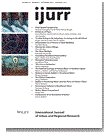Neoliberal urban environmental governance is premised in part on the development of collaborative arrangements between state and non-state actors through which residents in informal settlements are encouraged to participate in their own governance. The neoliberal rationality of participation is implemented through governmental techniques such as responsibilization, whereby residents are rendered responsible for provision of basic environmental services previously seen as the responsibility of government authorities. However, neoliberal urban governance is incomplete, fragmented and fractured, affording room for maneuvering and innovative social agency, whereby residents mimic, reinterpret, negotiate and contest neoliberal subject formations. In this article, we discuss how engaged scholarship can facilitate such alternative productions of neoliberal subjectivities through the development of ‘knowledge encounters’. We draw on cases of solid waste management and environmental risk governance in the informal settlements of Los Platanitos, Santo Domingo Norte, Dominican Republic, and Gaviotas Sur, Villahermosa, Mexico, to suggest that knowledge encounters facilitated through engaged ethnography furnish stages for alternative conceptions of responsibility, whereby residents negotiate neoliberal techniques of governance through diverse forms of acquiescence, reconfiguration and contestation.
Details
Written by:
Bj⊘rn Sletto and Anja Nygren
Digital Object Identifier (DOI)
10.1111/1468-2427.12315
About DOI

